|
|
|
Sort Order |
|
|
|
Items / Page
|
|
|
|
|
|
|
| Srl | Item |
| 1 |
ID:
087932
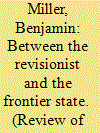

|
|
|
|
|
| Publication |
2009.
|
| Summary/Abstract |
This article explains variations in state war-propensity. I introduce a new typology of state war-proneness based on four major types of states: revisionist, failed, frontier, and status quo. The major novel contribution of this essay is the argument that the combined effect of variations in the extent of success in state-building (strong or weak states) and nation-building (nationally congruent or incongruent) shapes the level and the type of state violence by producing different categories of states with regard to their war-propensity. Strong states but nationally incongruent generate revisionist states, which initiate aggressive wars. The combination of state strength and national congruence leads to a status quo state. Weakness and incongruence bring about civil wars and foreign intervention in 'failed' states. Weakness but congruence produce the 'frontier state' with boundary and territorial wars, but also with a reasonable likelihood of evolution of status quo orientation over time. I focus here on key examples of these types of states, especially from two regions: Iraq and Lebanon in a highly war-prone region - the post-World War II Middle East; and Argentina and Brazil in a more peaceful one, at least in the 20th century - South America, although these states experienced quite a number of wars in the 19th century.
|
|
|
|
|
|
|
|
|
|
|
|
|
|
|
|
| 2 |
ID:
087942


|
|
|
|
|
| Publication |
2009.
|
| Summary/Abstract |
The Commonwealth of Independent States (CIS) was designed to manage the collapse of the Soviet Union and foster post-Soviet cooperation in political, economic, and security spheres. Over a decade into its existence, most analysts would rate it a failure: many post-Soviet states do not participate in CIS ventures, the institutional machinery of the CIS is weak, and Russia, the most dominant post-Soviet state, has tended to favour bi-lateral relationships over multi-lateral institutions. Why is this the case? This article looks at the CIS through the prism of theories of regionalism, demonstrating that the CIS was handicapped on many fronts, including emergent multi-polarity in the post-Soviet space and domestic-level political considerations in many post-Soviet states.
|
|
|
|
|
|
|
|
|
|
|
|
|
|
|
|
| 3 |
ID:
087935


|
|
|
|
|
| Summary/Abstract |
Students of regionalism almost reflexively include North America in their lists of regions in contemporary global politics. Inevitably students of regionalism point to the integrative agreements between the countries of North America: the two free trade agreements that transformed the continental economy beginning in the late 1980s - the Canada-US Free Trade Agreement that came into force on 1 January 1989, and the North American Free Trade Agreement (NAFTA) between the United States, Mexico, and Canada, that came into force on 1 January 1994 - and the Secutity and Prosperity Partnership of North America (SPP), launched in March 2005. These agreements, it is implied, are just like the integrative agreements that forge the bonds of regionalism elsewhere in the world. We argue that this is a profound misreading, not only of the two free trade agreements of the late 1980s and early 1990s and the SPP mechanism of 2005, but also of the political and economic implications of those agreements. While these integrative agreements have created considerable regionalisation in North America, there has been little of the regionalism evident in other parts of the world. We examine the contradictions of North America integration in order to explain why North Americans have been so open to regionalisation but so resistant to regionalism.
|
|
|
|
|
|
|
|
|
|
|
|
|
|
|
|
| 4 |
ID:
087936
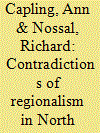

|
|
|
|
|
| Publication |
2009.
|
| Summary/Abstract |
Students of regionalism almost reflexively include North America in their lists of regions in contemporary global politics. Inevitably students of regionalism point to the integrative agreements between the countries of North America: the two free trade agreements that transformed the continental economy beginning in the late 1980s - the Canada-US Free Trade Agreement that came into force on 1 January 1989, and the North American Free Trade Agreement (NAFTA) between the United States, Mexico, and Canada, that came into force on 1 January 1994 - and the Secutity and Prosperity Partnership of North America (SPP), launched in March 2005. These agreements, it is implied, are just like the integrative agreements that forge the bonds of regionalism elsewhere in the world. We argue that this is a profound misreading, not only of the two free trade agreements of the late 1980s and early 1990s and the SPP mechanism of 2005, but also of the political and economic implications of those agreements. While these integrative agreements have created considerable regionalisation in North America, there has been little of the regionalism evident in other parts of the world. We examine the contradictions of North America integration in order to explain why North Americans have been so open to regionalisation but so resistant to regionalism.
|
|
|
|
|
|
|
|
|
|
|
|
|
|
|
|
| 5 |
ID:
087941
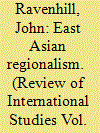

|
|
|
|
|
| Publication |
2009.
|
| Summary/Abstract |
East Asia has emerged over the last decade as the most active site for the negotiation of regional inter-governmental collaboration. The primary focus has been on trade but, in the wake of the financial crises, governments have also engaged in historically unprecedented collaboration in several areas of finance. Multiple factors have driven this new regional engagement. Although the agreements have been primarily economic in their focus, the primary motivation for many of them has been to secure diplomatic or strategic gains. The aggregate benefits from the agreements are likely to be limited given the low levels of tariffs and the availability of provisions that facilitate the intra-regional exchange of components. They may, however, be of significant interest to producers of specific products either because they provide advantage over competitors (or remove the advantage that competitors through agreements that their governments have signed). The trade agreements thus often reflect particularistic interests that governments have been enlisted to champion.
|
|
|
|
|
|
|
|
|
|
|
|
|
|
|
|
| 6 |
ID:
087937


|
|
|
|
|
| Publication |
2009.
|
| Summary/Abstract |
The breakdown of the North-South, East-West governing principles, and the removal of superpower overlay have led to an increasingly decentralised system setting the stage for the so called new geography of trade and the reconfiguration of political - diplomatic strategies. Such strategies now include contestation, articulation, competitive liberalisation, ample inter-state coalition building such as the G-20, G-33, G-90 in the Doha Round and the proliferation of regional and wider ranging preferential arrangements. Regionalism is both policy and project. Agreements vary widely in motivation, form, coverage and content. It is very often the case that, as in multilateral institutions, one major actor sets the agenda at the regional level with the view not only of constructing and retaining power at that level but also of setting global precedents. New balancing or bandwagoning efforts vis-à-vis the local strong power are set in motion with fresh implications for the emerging global architecture. Regional alignments are thus constantly shaping and reshaping market relations. Intra-Latin American agreements (those not including the majors, the US and the EU) were motivated by the search for wider markets building up economies of scale amongst similar countries. Such agreements mostly focused on market liberalisation through diverse schedules of tariff reduction. The result has been the emergence of shallow regional agreements. Nonetheless, most have not been fully implemented, but they show a long term trend towards potential convergence, especially if the Community of South American Nations moves on. External pressures have also spurred agreements as defensive mechanisms. So we witness impulses to regionalism complementing and at times competing with older patterns and trends. This contribution focuses on the different avenues that Latin America is undertaking in terms of regional projects. It will assess the dynamics of intra- regional integration and the inter-action effects with varieties of North-South integration.
|
|
|
|
|
|
|
|
|
|
|
|
|
|
|
|
| 7 |
ID:
087930
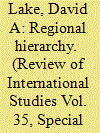

|
|
|
|
|
| Publication |
2009.
|
| Summary/Abstract |
The ordering principle of international relations varies widely across regional
security complexes and has profound effects on regional order. States form hierarchies over
one another based on relational authority, which itself rests on social contract theories that
posit authority as an equilibrium of an exchange between a dominant state and the set of
citizens who comprise the subordinate state. Regional orders emerge because of the strong
positive externalities of social order and economies of scale in its production, and the mutually
reinforcing legitimacy accorded the dominant state by local subordinates. This implies that
regions characterised by the hierarchy of single dominant states will possess more peaceful
regional orders. Regions often described as pluralistic security communities in which cooperation
is understood to have emerged spontaneously from anarchy are better described as
regional hierarchies in which peace and conflict regulation are the products of the authority of
a dominant state.
|
|
|
|
|
|
|
|
|
|
|
|
|
|
|
|
| 8 |
ID:
087929
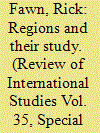

|
|
|
|
|
| Publication |
2009.
|
| Summary/Abstract |
Long a focal point in the study of Geography, regions have become a major concern of International Relations, and for some even its essence. Principle definitions and approaches, however, remain contested, as do the contexts in which and how they matter, from economic to security. This article examines contested views on what constitutes a region and on the nature and functioning of regional architecture, drawing from thematic and case-specific literature to indicate the expanse of analytical enquiry. These include the roles and interpretations of geography, identity, culture, institutionalisation, and the role of actors, including a hegemon, major regional powers and others actors from within a region, both state and societal. A final section indicates additional areas for future research.
|
|
|
|
|
|
|
|
|
|
|
|
|
|
|
|
| 9 |
ID:
087934
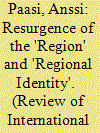

|
|
|
|
|
| Publication |
2009.
|
| Summary/Abstract |
'New regionalism', 'region', 'city-region', 'cross-border region', 'border' and 'identity' have become important catchphrases on the global geo-economic and geopolitical scene. The resurgence of these terms has been part of the transformation of both political economy and governance at supra-state, state and sub-state scales. Regions have been particularly significant in the EU where both the making of the Union itself and the 'Europe of regions' are concrete manifestations of the re-scaling of state spaces and the assignment of new meanings to territory. Such re-scaling has also led to increased competition between regions; a tendency that results from both the neo-liberalisation of the global economy and from a regionalist response. Regional identity, an idea at least implicitly indicating some cohesiveness or social integration in a region, has become a major buzzword. It has been particularly identified in the EU's cohesion policy as an important element for regional development. In spite of their increasing importance in social life and academic debates, regions, borders and identities are often studied separately, but this paper aims at theorising and illustrating their meanings in an integrated conceptual framework and uses the sub-state regions in Europe, and particularly in Finland, as concrete examples. Regions are conceptualised here as processes that gain their boundaries, symbolisms and institutions in the process of institutionalisation. Through this process a region becomes established, gains its status in the broader regional structure and may become a significant unit for regional identification or for a purported regional identity. This process is based on a division of labour, which accentuates the power of regional elites in the institutionalisation processes.
|
|
|
|
|
|
|
|
|
|
|
|
|
|
|
|
| 10 |
ID:
087939
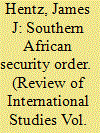

|
|
|
|
|
| Publication |
2009.
|
| Summary/Abstract |
Theories in international relations, predicated on particular assumptions, for explaining the relationship between regional economic integration and regional security miss the challenges to security in the developing world. Unlike the developed world, regional interdependence in much of the developing world engenders negative externalities. The relationship between regional economic integration and regional security depends on the nature of the security threats that define the region - traditional state vs state threats on one hand versus new security threats on the other hand. The nature of the security threat, or security dilemma, will determine how different forms of regional economic integration, laissez faire, functional, and developmental, define or re-define a particular regional security order. Building a 'security community' in the developing world, therefore, calls for new architectural principles. In the case of southern Africa, both, laissez faire (free trade area) and functional cooperation (spatial development initiatives) will foster insecurity rather than security.
|
|
|
|
|
|
|
|
|
|
|
|
|
|
|
|
| 11 |
ID:
087931


|
|
|
|
|
| Publication |
2009.
|
| Summary/Abstract |
By now arguments about the varieties of international order abound in International Relations. These disputes include arguments about the security mechanisms, institutions, and practices that sustain international orders, including balance of power and alliances, hegemony, security regimes based on regional or global institutions, public, private, and hybrid security networks, as well as different kinds of security communities. The way these orders coexist across time and space, however, has not been adequately theorised. In this article we seek to show (A) that, while analytically and normatively distinct, radically different orders, and in particular the security systems of governance on which they are based (such as balance of power and security community), often coexist or overlap in political discourse and practice. (B) We will attempt to demonstrate that the overlap of security governance systems may have important theoretical and empirical consequences: First, theoretically our argument sees 'balance of power' and 'security community' not only as analytically distinct structures of security orders, but focuses on them specifically as mechanisms based on a distinct mixture of practices. Second, this move opens up the possibility of a complex (perhaps, as John Ruggie called it, a 'multiperspectival') vision of regional security governance. Third, our argument may be able to inform new empirical research on the overlap of several security governance systems and the practices on which they are based. Finally, our argument can affect how we think about the boundaries of regions: Beyond the traditional geographical/geopolitical notion of regional boundaries and the social or cognitive notion of boundaries defined with reference to identity, our focus on overlapping mechanisms conceives of a 'practical' notion of boundaries according to which regions' boundaries are determined by the practices that constitute regions
|
|
|
|
|
|
|
|
|
|
|
|
|
|
|
|
|
|
|
|
|